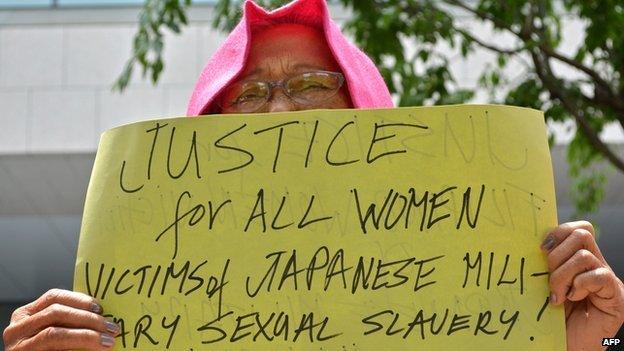Media slam Japan over 'comfort women' denial
- Published

A former "comfort woman" demands justice near the parliament in Tokyo
Media in China slam Japan over its latest denial that it was using "comfort women" during World War II forcing them to work in military brothels .
According to reports, Japanese Chief Cabinet Secretary Yoshihide Suga has rejected his predecessor Yohei Kono's statement made in 1993, admitting that the Japanese military had coerced women into being sex slaves.
A commentary in the People's Liberation Army Daily, external observes that this is the first time the Japanese government has openly rejected Mr Kono's admission.
Criticising right-wing forces in Japan, the article says the "denial" and "distortion" of history have strongly damaged the reputation of the country.
Lashing out at Japan, a front-page commentary in the overseas edition of the People's Daily, external says that "denial of history will never earn respect".
"The administration of PM Shinzo Abe is scheming to escape responsibilities and cover up their wrongdoing, but no matter what means they resort to, they are not able to deceive anyone," writes the paper.
"Japan has said it wants to be a peaceful nation and calls for meetings with the top leaders of neighbouring countries to develop friendly ties, but it keeps denying its sins of militarism, causing its neighbours and the international community to be worried," says the article.
A report in the Guangming Daily, external accuses Japan of duplicity.
"The Abe regime is trying to be friendly with Beijing, Seoul and Pyongyang and is temporarily hiding its arrogance in order to achieve a diplomatic breakthrough," says the daily, "However, Mr Suga's comments remind us once again that the conservative right-wing forces in Japan have never stopped distorting history by using even more despicable and sinister means."
Hong Kong protests
Meanwhile, papers are stepping up calls for protests in Hong Kong to end, after talks between the authorities and student leaders ended in deadlock.
Describing the protesters as "political fanatics" who insist "on demands that have no legal standing", the China Daily, external points out that electoral reform "must always be done within the legal framework… in accordance with the Basic Law".
"The delusion of eventually turning the city into an independent political entity… is a road leading to a dead end," the paper argues.
"It is time for student leaders and other organizers of the 'Occupy' campaign to call off their protests and get back on the right track. After all, standing on a treacherous fault line, they stand no chance of achieving what they want," China Daily concludes.
Echoing similar views, an article in the Haiwai Net, external also urges the protesters "not to miss the opportunity" to end their campaign.
The article points out that the Hong Kong government has made it clear it will "feedback the opinion of the people to Beijing".
"The government's statement has provided student leaders with an opportunity to step down (to prevent embarrassment). What the government really meant is: 'We are unable to accede to your illegal request; we will convey your message and you should disperse,'" explains the article.
It further warns that the authorities have obtained "evidence of the protesters' illegal actions" and that no-one will be able to rescue them "from the grip of the law".
A strongly worded commentary by the Xinhua, external news agency lambasts some Hong Kong celebrities for supporting the protest.
"Chapman To and the like, stop thinking that you could still eat from us while breaking our pot," exclaims the article.
The agency claims that close to 100,000 netizens in mainland China have called for a boycott on Hong Kong celebrities.
"The netizens' counter-attack on these heartless celebrities upholds justice. It is also a display of patriotism," says Xinhua. The agency criticises Hong Kong celebrities for being "ungrateful", as "the mainland market and fans are the ones who feed them".
Army troubles
And finally, media highlight a discussion about the need to apply the "rule of law" in the armed forces after a powerful military body warned of "ideological struggles" in the army.
On Wednesday, the Central Military Commission published a front-page article in the People's Liberation Army Daily, external, urging the military to remain loyal to the Communist Party's leadership and strengthen the "rule of law".
The article notes that ideological struggles and differing views within the People's Liberation Army (PLA) are "exceptionally acute and complicated", and that military reform could be hindered by "structural problems".
"There have been some public intellectuals advocating the nationalisation of the army through disaffiliating it from the Party's leadership," PLA Major General Luo Yuan tells English-language daily Global Times, external.
Talking to the same paper, military expert Xu Guangyu points out that "the army has to address the corruption problem".
BBC Monitoring, external reports and analyses news from TV, radio, web and print media around the world. For more reports from BBC Monitoring, click here. You can follow BBC Monitoring on Twitter, external and Facebook, external.